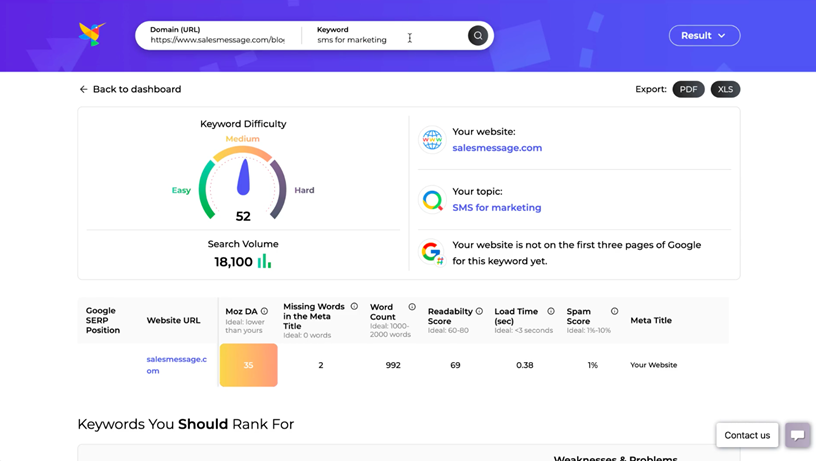Driving organic traffic from search often requires attaining high Google rankings. Often, I see marketers creating content with that goal but without keeping keyword research in mind. They expend valuable time and effort creating a piece that ultimately falls flat.
Marketers often mistakenly create #content to draw organic traffic without keeping keyword research in mind, says @JohnHall via @CMIContent. #SEO Click To TweetHowever, when you target the right keywords for your business, SEO can be one of the most valuable and highest ROI channels. But how do you identify and prioritize the right keywords? A consistent keyword research process can make your job easier.
Answer these four questions to qualify and find keywords that will deliver for your brand.
Is your site deep enough?
Just because a keyword has low competition doesn’t mean your site will easily rank for it. If you have not written much publicly about the subject, you do not have the necessary topical depth authority. In Google’s eyes, your site – even if your business has decades of experience on this topic – still falls into the newbie category.
To break out of newbie status, make sure you have published at least six articles on that same general topic in the last three months.
Gain topical depth authority by publishing at least six articles in the last three months on the general subject, says @JohnHall via @CMIContent. #SEO Click To TweetIs the keyword really valuable?
Possessing topical authority for a keyword doesn’t necessarily mean you should pursue it. Targeted keywords should relate in some way to your business revenue.
For example, a calendar platform site might rank well for the keyword “time management.” But people who search for that phrase are likely looking for information about the topic. They will read the article on the site, but they won’t convert into customers. (I use this example from my knowledge as an investor in Calendar.com.)
However, if the calendar platform site ranks for the keyword phrase “alternatives to Calendly” on a listicle or internal page, the readers of this content would be 100% interested in the platform’s business offering and convert much better since they are looking for a solution in the space.
A successful SEO strategy should tie to your company’s offerings for maximum ROI. Otherwise, the content won’t really benefit the business in the long term. Choose keywords that have both your topical depth authority and relevance to revenue.
A targeted keyword for which your business can rank but isn’t likely to convert into revenue is not a smart choice, says @JohnHall via @CMIContent. #SEO Click To TweetHow authoritative is your site?
While topical depth authority grows in importance to Google rankings, general site popularity remains a factor. Your website’s domain authority (DA) indicates how well your pages are likely to rank for the targeted keywords. Use a tool like Moz domain authority checker, Domain Rating from Ahrefs, or Authority Score from Semrush. Compare your site’s score to the sites already ranking for your target keywords. If your score isn’t close to their scores, you won’t find it easy to rank for that keyword.
In general, companies with high domain authority scores or ratings will have an easier time ranking for competitive keywords. If you’re a smaller company with a low domain authority, spend your time focusing on lower-volume search terms.
How do you spot content competitors’ weaknesses?
The secret sauce to a winning SEO strategy is capitalizing on the weaknesses and problems you find on the search engine results page. Among the weak signals that could indicate positive opportunities to pursue:
- Page title misses terms in your target keyword
- Page word count is less than 1,000 words
- Page takes more than three seconds to load
- Page was published over six months ago
- Page is a forum site such as Quora, Reddit, Twitter, Facebook, or LinkedIn
- Page’s Moz spam score is above 10%
- Page reading level is at least ninth grade
- Page mobile user experience is poor
Find a keyword with a few of these weakness indicators in the results for which your company already has the topical depth and domain authority. Then, you can capitalize on them to create content that delivers better for the audience and the search engine results page.
Putting it all together
It can be helpful to start your keyword search using a tool like Ahrefs to get insights into monthly keyword search volumes and competitor domain authority to get a baseline understanding of ranking difficulty. But you still must evaluate the search results to find weaknesses to capitalize on.
A variety of tools can help in that process. TopicRanker shows how to use the data to make better decisions around keyword research. Enter your website’s URL and a topic relevant to your business expertise. (Avoid using generic keywords.)
In this example, I input www.salesmessage.com/ as the URL with the keyword “sms for marketing.” The results indicate it has a medium keyword difficulty with a search volume of 18,100. It includes the Moz domain authority for the site along with the missing number of words in the meta title, word count, readability score, load time, and spam score.

The TopicRanker tool can:
- Analyze your website and inputted keyword
- Crawl search results for thousands of keywords related to that topic to find specific weaknesses and problems in the SERP
- Uncover all the search results where the content does a poor job of helping the reader
- Suggest keywords your company should be able to rank for (usually between five and 10).
- Break down the SERP results for each suggested keyword, showing competitor weaknesses on which you can capitalize and create a better piece of content
Making SEO progress
With so much competition for attention, you can’t simply create content based on gut feelings. It requires knowing which questions to ask and, more importantly, which answers will lead to the creation of an effective SEO strategy. Failure to do that means you’ll exhaust resources creating content that doesn’t impact your company’s bottom line. But by following this process, you can create winning content that ranks high and brings customers organically.
All tools mentioned in the article are identified by the author. If you have a tool to suggest, please feel free to add it in the comments.
HANDPICKED RELATED CONTENT:
Cover image by Joseph Kalinowski/Content Marketing Institute


